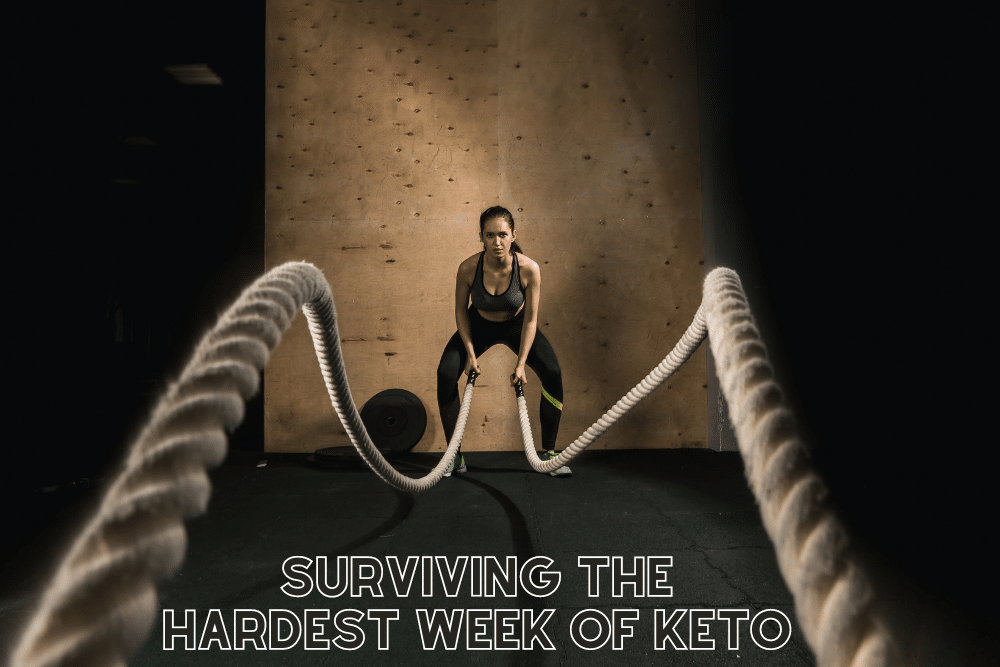The ketogenic diet, with its remarkable promises of weight loss and enhanced well-being, has emerged as a leading approach in the nutritional realm. This high-fat, low-carbohydrate diet shifts your body into ketosis, burning fat for fuel instead of glucose. However, embarking on this path comes with unique challenges, especially during the initial phase. Among these, the ‘hardest week of keto’ stands out as a significant hurdle, often characterised by a mix of physical and mental adjustments as your body transitions into ketosis.
Understanding your difficulties during this crucial period is the heart of our blog’s intent. We’re here not just to discuss what makes this phase challenging but to arm you with strategies, encouragement, and real-life tips to help you thrive. Whether you’re battling the keto flu, managing cravings, or seeking motivation to keep going, our goal is to guide you through the ‘hardest week of keto’ with ease and confidence. This blog is your companion, offering insight and support as you navigate the complexities of keto adaptation, ensuring you emerge victorious and ready to embrace the full potential of your keto journey.
Understanding the Keto Diet

Diving into the ketogenic diet reveals a world where the traditional food pyramid is flipped on its head. This diet embraces a high-fat, moderate-protein, and low-carbohydrate intake, challenging conventional beliefs about fats and health. The goal? To usher your body into a state known as ketosis, a metabolic shift that occurs when your body starts burning fat for fuel instead of carbs. This pivotal change is the secret behind the diet’s weight loss efficacy and contributes to improved mental clarity, energy levels, and other health benefits.
But what exactly happens during ketosis, and why is it so beneficial? When you drastically reduce your carbohydrate intake, your body is forced to find an alternative energy source. It turns to stored fats, breaking them into ketones, fueling your body and brain. This process is at the heart of the ketogenic diet’s effectiveness and is responsible for its most touted benefits, from shedding pounds to stabilising blood sugar levels.
Navigating through the hardest week of keto requires a deep understanding of these principles and the physiological changes your body undergoes. For a more in-depth exploration of ketosis and how to successfully adapt to these changes, click here to learn more about the process and its benefits. This knowledge is crucial in preparing you for the journey ahead, ensuring you’re well-equipped to tackle the challenges and reap the rewards of your keto lifestyle.
The First Week: What Makes it the Hardest Week of Keto?

Embarking on the ketogenic diet propels you into its most daunting phase: the hardest week of keto. This crucial period acts as the battlefield where your longstanding dietary habits clash with the novel principles of keto. Specifically, it signifies the transition phase where your body, once reliant on glucose for energy, must adapt to deriving its power from ketones. This significant metabolic shift doesn’t occur without resistance, manifesting symptoms that test the resolve of even the most committed individuals.
The hardest week of keto is notorious for introducing the phenomenon known as keto flu. This condition mirrors flu-like symptoms, including fatigue, headaches, dizziness, and irritability, attributed to your body’s carbohydrate withdrawal and its efforts to adjust to ketones as its new energy source. Additionally, this week is marked by intense cravings for sugary and carb-laden foods as your body instinctively signals for its accustomed energy source. Energy dips are also frequent, adding another layer of complexity to this adaptation phase.
But why is this phase termed the hardest week of keto? These symptoms collectively represent the body’s initial resistance to a drastic dietary change. However, understanding that this challenging period is a temporary adjustment phase empowers you to persevere, knowing that these hurdles will soon be overcome. With the right strategies to alleviate these symptoms, such as staying hydrated, replenishing electrolytes, and consuming keto-friendly snacks to curb cravings, you can facilitate a smoother transition into ketosis.
Navigating through the hardest week of keto with patience and preparedness sets a strong foundation for your continued journey on the ketogenic diet. By anticipating these challenges and equipping yourself with coping mechanisms, you will emerge from this phase more adapted to your keto lifestyle, ready to reap the benefits that await.
Symptoms and Challenges

Navigating through the hardest week of keto brings its set of symptoms and challenges, prominently marked by the onset of what is often termed the keto flu. This array of symptoms primarily includes fatigue, headaches, and irritability, which tend to peak between days 3 and 7 of embarking on the keto diet. These indicate your body’s initial resistance to switching from glucose to ketones for energy, a significant shift that can take a toll on your physical and mental well-being. Here’s a breakdown of the typical symptoms you might experience:
- Fatigue: A profound sense of tiredness or lack of energy is common as your body transitions from using glucose to ketones for energy.
- Headaches: The sudden reduction in carbohydrate intake can lead to dehydration and electrolyte imbalances, often manifesting as headaches.
- Irritability: Emotional and mood changes are not uncommon as your body adapts to a new fuel source, often leading to feelings of irritability.
Beyond the keto flu, there are additional challenges you might face during the hardest week of keto, including:
- Decreased Strength and Endurance: As your body shifts energy sources, you may notice a temporary decline in your physical performance.
- Mental Fog: Concentration and cognitive function can momentarily suffer, leading to what many describe as ‘mental fog.’
- Digestive Issues: Changes in diet can disrupt your digestive system, resulting in issues like constipation or diarrhoea as your body adjusts to higher fat intake.
These symptoms collectively contribute to why this period is often referred to as the hardest week of keto. They signal your body’s adaptation to a new way of generating energy, a transition that, while temporary, can feel quite daunting. However, recognising these symptoms as natural steps in your keto journey can help you prepare and manage them effectively. Staying hydrated, maintaining electrolyte balance, and gradually easing into physical activities can mitigate some of these challenges, making the adaptation process smoother.
Understanding the nature and timeline of these symptoms during the hardest week of keto is crucial. It equips you with the knowledge and strategies to push through this initial hurdle, paving the way for your keto journey’s more comfortable and rewarding phases.
Tips for Overcoming Initial Challenges

Tackling the hardest week of keto head-on requires a strategic approach, especially when you’re navigating the initial challenges that come with shifting your body’s primary energy source. Here are some tried and true tips to help you overcome these hurdles and make the transition smoother:
- Hydration and Electrolyte Management: One of the keystones for getting through the hardest week of keto is staying well-hydrated and keeping your electrolytes in balance. Drinking plenty of water and supplementing with magnesium, potassium, and sodium can help ward off the dreaded symptoms of keto flu.
- Dietary Recommendations: Gradually easing into ketosis can also make a significant difference. Focus on incorporating healthy fats like avocados, olive oil, and nuts; moderate amounts of protein from sources like chicken, fish, and tofu; and an abundance of low-carb vegetables. This balanced approach ensures your body receives the nutrients it needs without the shock of a drastic dietary change.
- Gentle Exercise: While you might not feel up to your usual workout intensity, incorporating gentle exercise into your routine can aid your transition into ketosis. Activities like walking, yoga, or light stretching can keep you active without overtaxing your body as it adapts to its new fuel source.
- Adequate Rest: Never underestimate the power of good rest during the hardest week of keto. Your body is undergoing a significant metabolic shift, so permitting yourself to rest more than usual can help alleviate symptoms and support your body’s adjustment process.
By implementing these strategies, you can navigate the challenges of the hardest week of keto with more ease and confidence. Remember, this period is temporary, and with the right support and adjustments, you’ll soon find yourself on the other side, ready to embrace the full benefits of your ketogenic lifestyle.
Strategies to Stay Motivated
![]()
Surviving the hardest week of keto is as much about mental strength as it is about physical adaptation. Staying motivated can sometimes feel like an uphill battle, but with the right strategies, you can keep your spirits high and your goals in sight. Here are some tips to help you stay motivated through the hardest week of keto and beyond:
- Setting Realistic Expectations: It’s important to understand that weight loss and adaptation to the keto diet can vary greatly from person to person. Setting realistic expectations for this journey will help you remain patient and kind to yourself as your body adjusts. Remember, the hardest week of keto is just the beginning, and the benefits will unfold over time.
- Finding Community Support: There’s strength in numbers, and finding a community that shares your keto journey can be incredibly motivating. Look for forums, social media groups, or even a keto buddy who can relate to your experiences. Sharing tips, challenges, and successes with others who understand the hardest keto week can encourage you to persevere.
- Celebrating Small Victories: Every step forward is an achievement worth recognising. Whether it’s resisting a carb craving, feeling more energetic, or completing the hardest week of keto, celebrating these small victories can boost your motivation immensely. Acknowledging your progress reinforces your commitment and keeps the momentum going.
Implementing these strategies can significantly improve your ability to navigate the hardest week of keto. By embracing realistic goals, seeking support, and celebrating your achievements, you’ll find the strength to continue your keto journey, turning challenges into stepping stones toward your health and wellness aspirations.
Transitioning Beyond the First Week

Navigating past the hardest week of keto marks a significant milestone in your ketogenic journey. As you transition beyond this initial hurdle, you’ll likely notice profound changes affirming your persistence’s benefits. Here’s what you can expect and how to adjust your strategy as your body becomes more adapted to its new energy source:
- Increased Energy: One of the most rewarding outcomes after the hardest week of keto is the surge in energy levels. As your body becomes efficient at using ketones for fuel, you may have more stamina and less fatigue throughout the day.
- Clearer Cognition: Many individuals report enhanced mental clarity and focus once they’ve fully transitioned into ketosis. The brain fog that may have clouded your thoughts during the initial phase dissipates, leaving you with sharper cognition and better concentration.
- Potential Weight Loss: While individual results vary, many people begin to see significant weight loss results after overcoming the initial adaptation phase. This is a direct result of your body burning fat for energy, decreased insulin levels, and suppressed appetite.
As your body fully adapts to the ketogenic lifestyle, you may find it beneficial to fine-tune your approach:
- Introducing Intermittent Fasting: Many find synergies between keto and intermittent fasting, which can further enhance fat loss and improve metabolic health. If you’re feeling comfortable with your keto routine, exploring intermittent fasting windows might amplify your results.
- Targeted Carb Intake for Athletes: If you’re an athlete or engage in high-intensity workouts, incorporating a targeted carb intake around your training sessions can boost energy while maintaining overall ketosis.
Transitioning beyond the hardest week of keto opens up new avenues to optimise and personalise your dietary approach. As you become more attuned to your body’s needs and how it responds to the diet, you can make informed adjustments to continue reaping the benefits of keto, enhancing both your health and performance.
Long-term Success of Keto

Achieving long-term success on the ketogenic diet goes beyond simply surpassing the hardest week of keto. It involves a commitment to adapting the keto lifestyle to fit your individual life circumstances, preferences, and health goals. As you navigate life beyond the initial weeks, here are key strategies to ensure sustained success and well-being on your keto journey:
- Adapting Keto to Fit Your Life: Flexibility and adaptability are the keys to maintaining a keto lifestyle long-term. This means finding keto-friendly foods and recipes you enjoy, integrating keto into social and family settings without feeling restricted, and allowing yourself the occasional flexibility when needed. It’s about making the diet work for you, not the other way around.
- Monitoring Your Health: Regularly checking your health and wellness is crucial as you settle into your keto routine. Pay attention to how your body responds, tracking changes in weight, energy levels, and overall well-being. This can help you fine-tune your diet to suit your body’s needs better.
- Adjusting as Necessary: As your body changes, so do your dietary needs. This could mean adjusting your macro ratios, incorporating more variety into your meals, or even strategically adding carbs to your diet if you’re engaging in high-intensity activities. The goal is to listen to your body and respond to its signals.
- Consulting Healthcare Professionals: Partnering with healthcare professionals can provide invaluable insights into how the keto diet impacts your health conditions and goals. Regular check-ups and consultations can help you navigate potential challenges, ensuring your keto journey optimises your overall health.
Embracing these strategies can help you sustain your keto lifestyle over the long haul, turning what started as a diet into a sustainable, enjoyable way of living. Remember, the goal of keto is not just about losing weight or overcoming the hardest week of keto; it’s about enhancing your overall health and finding a dietary pattern that brings out the best in you.
Conclusion
In conclusion, understanding and preparing for the hardest week of keto is crucial to navigating the early stages of your ketogenic journey successfully. This challenging period, marked by significant physical and mental adjustments, tests your resolve but also serves as a critical stepping stone toward achieving ketosis and reaping its numerous health benefits.
We encourage you to persist through these initial hurdles with patience and determination. The symptoms and challenges you face during the first week are temporary and manageable with the right strategies. By staying hydrated, managing electrolytes, focusing on a balanced diet, and allowing yourself adequate rest, you can mitigate the impact of the keto flu and other common early obstacles.
Remember, the rewards that await beyond the hardest week of keto—increased energy, mental clarity, and potential weight loss—are well worth the effort. Each day, you’re one step closer to a healthier, more vibrant version of yourself. Embrace the journey, lean on the support of the keto community, and consult with healthcare professionals as needed to ensure your path to ketosis is both safe and effective.




